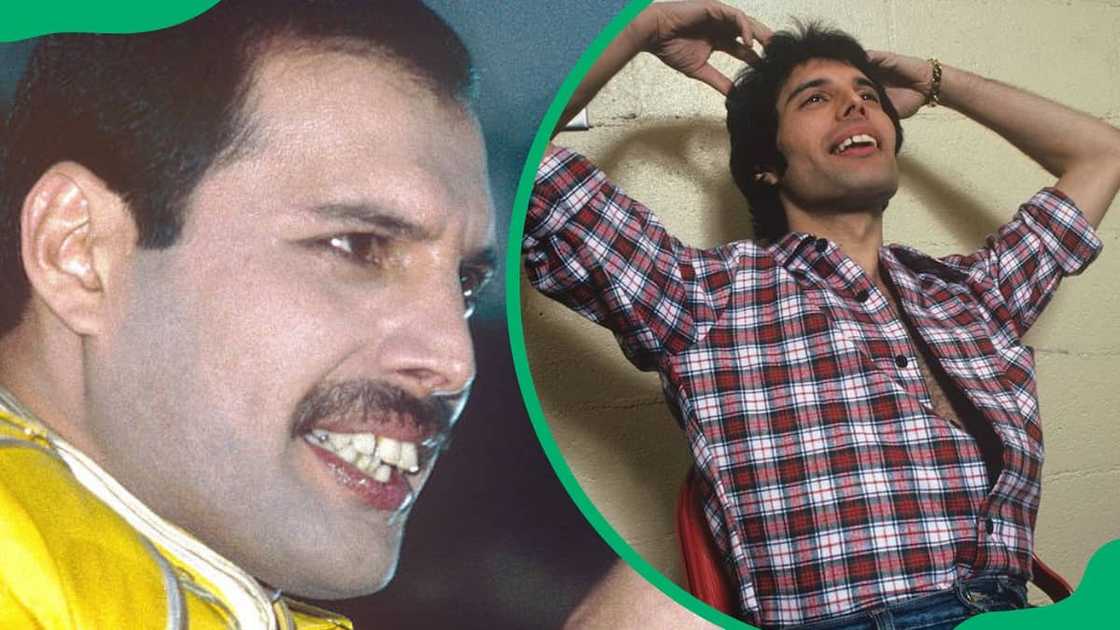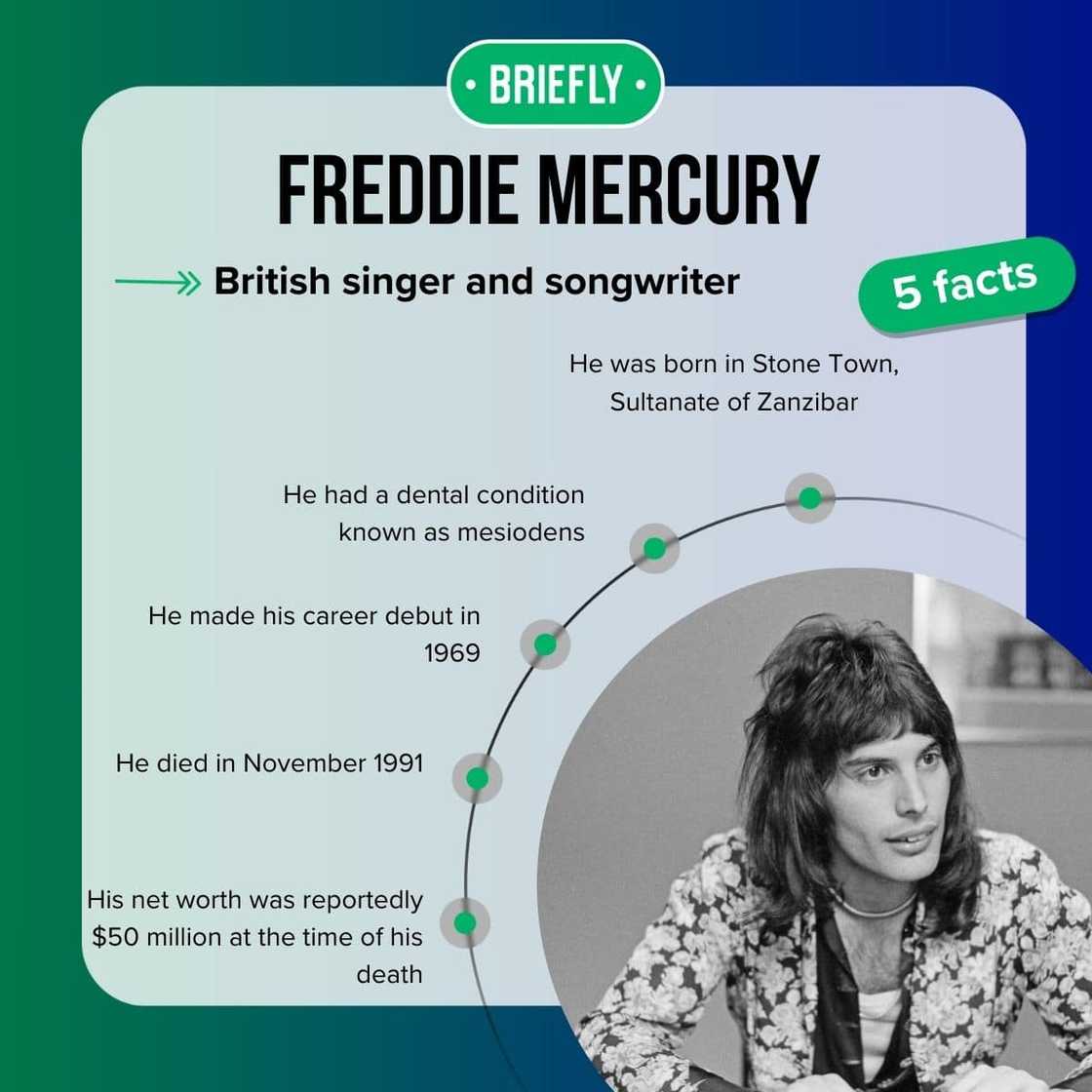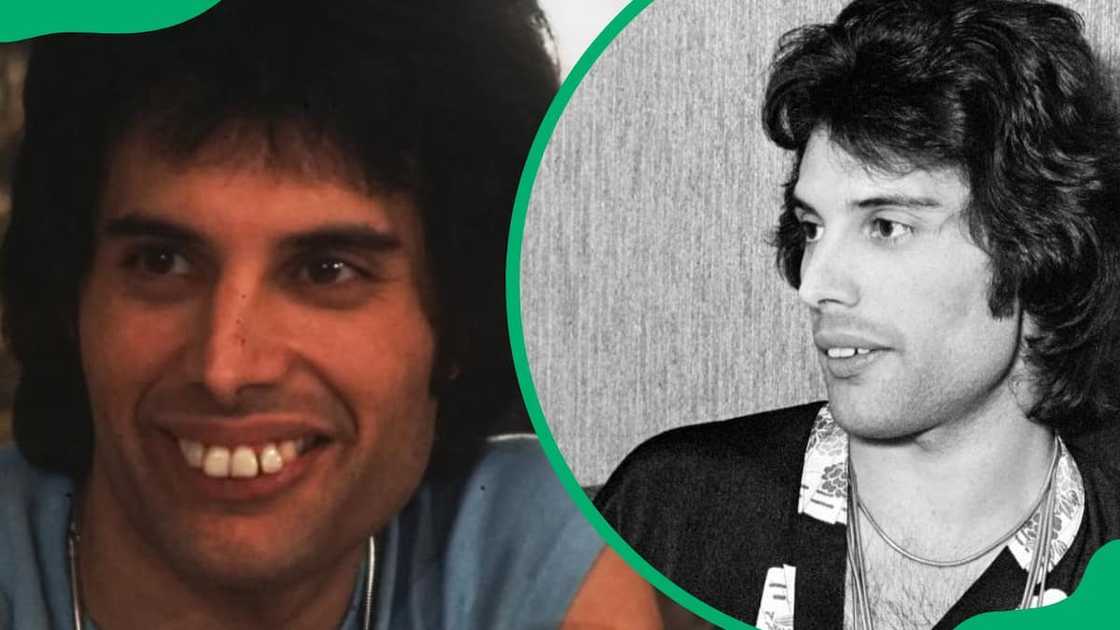Freddie Mercury's teeth: What is the story behind his iconic smile?
Freddie Mercury was a British singer and songwriter who gained notoriety as the lead pianist and vocalist of the rock band Queen. Widely regarded as one of the greatest rock musicians, he was known for his charismatic personality and four-octave vocal range. However, besides his natural talent, one aspect of Mercury’s appearance that often drew fans’ attention was his unique dental formula. So, what was wrong with Freddie Mercury's teeth?

Source: UGC
TABLE OF CONTENTS
Mercury’s teeth were integral to his identity, which he attributed to his vocal prowess. While they did not mirror societal beauty standards, the star considered them his symbol of individuality. This article explores the impact of Freddie Mercury’s teeth on his personal and professional life.
Freddie Mercury's profile summary
| Full name | Farrokh Bulsara |
| Famous as | Freddie Mercury |
| Other names | Larry Lurex |
| Gender | Male |
| Date of birth | 5 September 1946 |
| Date of death | 24 November 1991 |
| Age at death | 45 years old |
| Birthplace | Stone Town, Sultanate of Zanzibar |
| Place of death | Kensington, London, UK |
| Nationality | British |
| Ethnicity | Mixed |
| Religion | Christianity |
| Alma mater | Isleworth Polytechnic College Ealing Art College |
| Height | 5'10'' (177 cm) |
| Weight | 72 kg (159 lbs) |
| Hair colour | Black |
| Eye colour | Dark brown |
| Sexuality | Bisexual |
| Partners | Mary Austin (1970-1976), Jim Hutton (1985-1991) |
| Parents | Jer and Bomi Bulsara |
| Siblings | Kashmira Bulsara |
| Profession | Singer, songwriter, record producer |
| Years active | 1969-1991 |
| Net worth | $50 million |
| Social media | Instagram X (Twitter) |
How old was Freddie Mercury?
Freddie Mercury (aged 45 at the time of death) was born on 5 September 1946 in Stone Town, Sultanate of Zanzibar (now part of Tanzania).

Source: Original
His parents, Jer and Bomi Bulsara, raised him alongside his younger sister, Kashmira Bulsara. Bomi was a cashier at the British Colonial Office.
The singer spent most of his childhood in India, attending St. Peter’s School. After his family relocated to England in 1964, Freddie enrolled at Ealing Art College to study graphic art and design. He graduated with a diploma in 1969.
History of Freddie Mercury’s teeth
The rock singer was born with a rare dental disorder that often made his smile the centre of attention. Here is a look into Freddie Mercury’s teeth, which made him a victim of bullying as a young boy.
What was wrong with Freddie Mercury’s teeth?
Mercury had noticeably protruding teeth due to a condition known as mesiodens. According to the Cleveland Clinic, this is a rare case of supernumerary teeth. Farrokh had four extra incisors right behind his incisors.
This created an overabundance of teeth, pushing his upper teeth forward and causing them to protrude outwards.

Source: UGC
Freddie Mercury’s extra teeth, combined with their vertical misalignment, also known as an overbite, gave his smile much more attention than the rest of his face.
The National Library of Medicine reports that the frequency of supernumerary teeth in the general population is between 0.1% and 3.8%.
Why did Freddie Mercury not fix his teeth?
Despite having financial capability and access to cosmetic dentistry, Mercury did not opt to have his teeth fixed.
The songwriter believed that his extra teeth and overbite were the secret behind his extraordinary vocal range, which could go from a low-pitched vocal growl to a high-pitched operatic melody. The fear of losing his vocal ability made Freddie compromise his self-image for music.
Did Freddie Mercury’s extra teeth affect his vocal range?
While Farrokh’s teeth were unique, they did not contribute to his singing ability. However, the iconic musician had the rare ability to use his false cords. He was, therefore, able to produce a subharmonic vibration that could reportedly be the cause of his powerful voice.

Source: UGC
How did Freddie Mercury feel about his teeth?
Although Farrokh’s reluctance to get his teeth fixed may have insinuated that the star was unaffected by them, this was not the case. Per The Blast, Mercury’s imperfect smile lowered his self-esteem.
He was never happy with his overbite and allegedly covered his teeth with his upper lip. The Will Rock You singer often held the microphone slightly over his mouth to cover his teeth.
Freddie’s insecurities may have started at a young age, as his classmates nicknamed him Bucky due to his misaligned teeth.
At one time, Brian May, Queen’s lead guitarist, almost rejected Farrokh, fearing his smile would affect the band’s image and popularity among the young generation. Ironically, Mercury’s emotional torture could not convince him to seek orthodontics.
What happened to Freddie Mercury?
Bulsara was diagnosed with AIDS in April 1987. On 22 November 1991, he released a public statement detailing his medical condition.
Following the enormous conjecture in the press over the last two weeks, I wish to confirm that I have been tested HIV positive and have AIDS. I felt it was correct to keep this information private to date to protect the privacy of those around me. However, the time has come now for my friends and fans around the world to know the truth, and I hope that everyone will join me, my doctors and all those worldwide in the fight against this terrible disease. My privacy has always been very special to me, and I am famous for the lack of interviews. Please understand this policy will continue.

Source: UGC
The singer succumbed to bronchial pneumonia resulting from AIDS on 24 November 1991.
Freddie Mercury’s teeth became an iconic part of his image and contributed to the uniqueness of his smile. Despite the star's self-esteem problems, he never sought orthodontic treatment because he was convinced that his dental misalignment played a vital role in his extraordinary musical career.
READ ALSO: SZA before surgery: How the singer transformed her body and face
Briefly.co.za recently published lesser-known facts about SZA's plastic surgery speculations. Did she go under the knife to achieve her current looks?
SZA is an American singer-songwriter best known for the hits Good Days and Tread Carefully. Comparisons of her then and now photos have attracted controversy online, with fans speculating that she had undergone surgery.
Source: Briefly News

